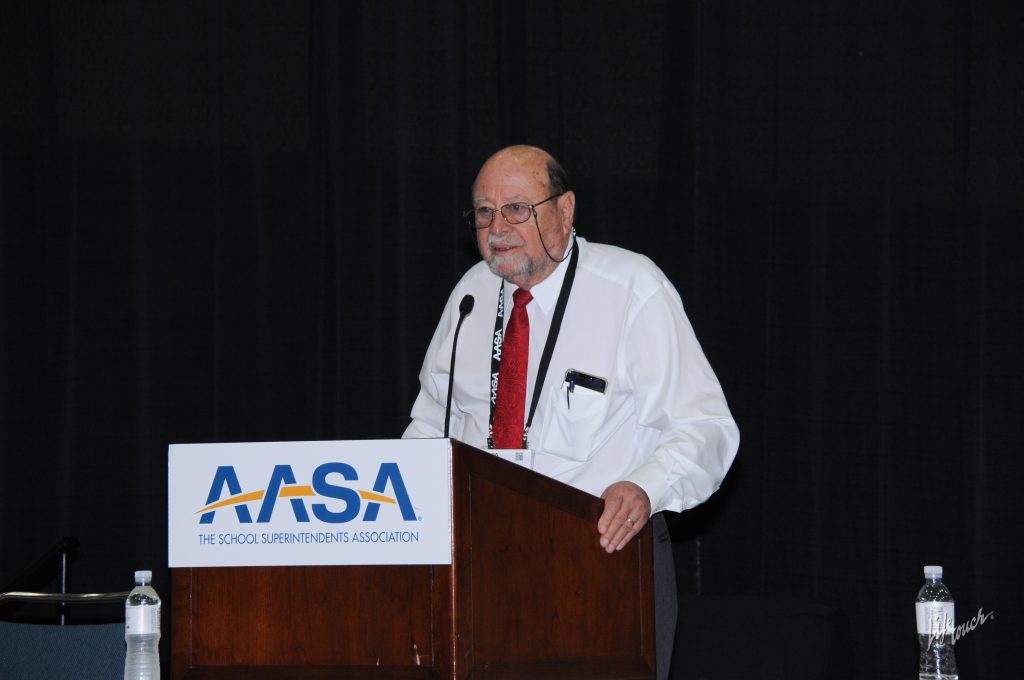“The biggest myth about testing is the one you’ve all been conned by … the teacher’s influence on standardized test scores,” explained David C. Berliner at an AASA conference session on Thursday. “I’m sorry to tell you they don’t have one – not very much at least.”
Berliner, a Regents professor of education emeritus at Arizona State University, delivered a Thought Leader presentation that took on the notion that teachers’ performance ought to be measured with the use of their students’ standardized test scores.
His one-year presentation attacked the claims surrounding standardized testing and the factors used to measure the quality of a school and its students. The central problems affecting schools do not exist solely in the classroom but rather stem from the outside environment.
“The influence on the variation of test scores attributable to teachers is about 10 percent, which means the amount of the variance attributed to outside school factors is about 60 percent. A 6 to 1 ratio is what will influence a test score,” Berliner explained. “And so to accept those as the measure of the quality of a school or teacher is ridiculous.”
Despite being a flawed system, , assessment in public education must consider six external factors to produce quality schools and desirable test scores.
Berliner emphasized that the care and nurturing of a community’s citizens dramatically affect standardized test scores and achievement outcomes. A state with higher rates of child poverty, less health care coverage and limited public libraries will significantly underperform compared to states with stronger public support.
“It’s easily predictable,” Berliner said. A quality school is unattainable without better living conditions.
A key factor is high-quality early childhood education for all children regardless of socio-economic background. Creating such programs is not only financially feasible but also socially and economically rewarding in the long term, Berliner said. The return on investment comes from reduced special education costs, lower health problems, lower incarceration rates and higher college attendance and employment rates.
Berliner quoted the great educational philosopher John Dewey, who said: “What the best and wisest parent wants for his child, that must we want for all the children of the community. Anything less is unlovely, and left unchecked, destroys our democracy.”
Berliner stressed the need to develop quality summer experiences for students. This has to do less with school work and more with having enriching experiences such as travel abroad and visits to museums and national parks. Life experiences, Berliner asserted, is what leads to better reading comprehension and overall success in school and future career prospects.
Additionally, housing impacts education significantly. The neighborhood cohort a child goes to school with matters.
“It’s no secret that our children are trapped,” Berliner said. “Not necessarily in our schools but certainly attracted to different neighborhoods based on their families’ income, ethnicity and race.”
It is vital to develop and grow middle-class neighborhoods and bring diverse income groups together under one roof. Doing so allows middle-class norms to prevail, resulting in less delinquency and absenteeism in schools.
Teachers are unable to teach chronically absent students which result in failed standardized tests and ultimately, skewed and inaccurate data insights into a teacher’s performance.
Chronically absent students are not random. Statistics show that this issue is strongly correlated with race and socioeconomic status. On average nationally, 33 percent of African American students are chronically absent compared to 3.6 percent of Asian American students. Moreover, children in foster homes or from low-income families are more likely not to attend school.
Lastly, without appropriately paid, qualified and experienced educational staff (teachers, bus drivers, counselors, librarians, nurses and social workers), test scores will continue to suffer. Berliner cited a National Public Radio report that states that Walmart truck drivers make more than double the average Arizona teacher’s annual income at $80,500. Consequently, educators, especially those in impoverished communities, leave their jobs in record numbers due to inadequate compensation, forcing schools to hire less experienced teachers.
Berliner reminded his audience that the only way to better our test scores is to go to the schools in person, talk to the staff and get feedback from the students.
Berliner likens a student’s academic achievement to a plant. If you sow a seed in good soil, it will bloom and flourish. Otherwise, he noted, it will wilt.
(Christian Balderas is a senior communication major at UCLA and an intern with AASA’s Conference Daily Online.)


